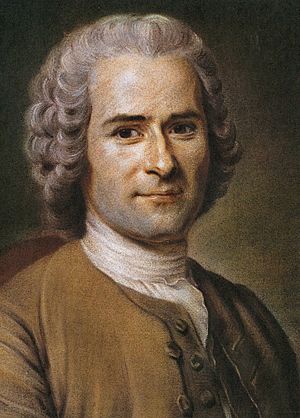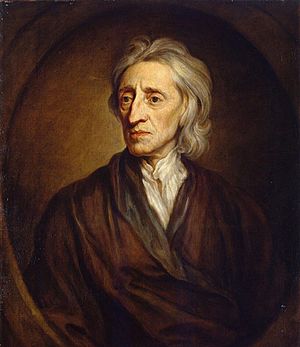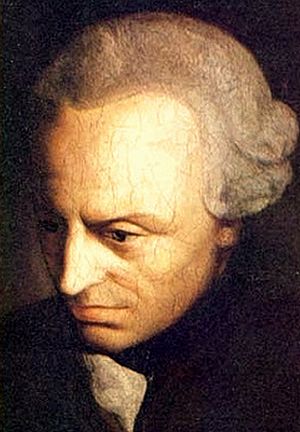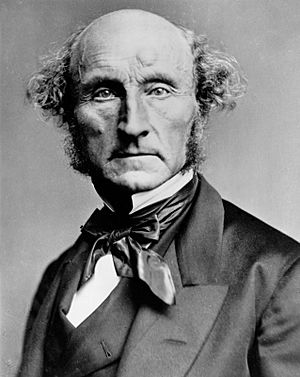Will (philosophy) facts for kids
Will is a big idea in philosophy that talks about a part of your mind. Think of it as your ability to choose and decide what you want to do. It's like having a control center in your brain that helps you make decisions and act on them.
Philosophers often discuss if our will is truly free. This is called free will. They wonder if our choices are really our own, or if they are already decided by things like nature or even a higher power. This idea is also connected to why bad things happen, even if we try to do good.
Contents
Ancient Ideas About Will
One of the first philosophers to talk a lot about will was Aristotle from ancient Greece. In his book Nicomachean Ethics, he explained different kinds of actions people take.
Types of Actions
Aristotle divided actions into three main types:
- Voluntary actions: These are things you choose to do on purpose. You know what you're doing, and you decide to do it. For example, if you decide to help a friend, that's voluntary.
- Involuntary actions: These are things you do without meaning to, or because you don't know all the facts. For example, if the wind blows you over, or you accidentally spill something because you didn't see it, those are involuntary. You usually aren't praised or blamed for these.
- Non-voluntary actions: These are actions you choose to do, but you don't really want to. You do them because all other options seem worse. For example, if you have to do a chore you dislike to avoid a bigger punishment, that's non-voluntary.
Aristotle believed that being good or bad (having virtue or vice) is "up to us." This means we choose our actions, and those choices shape our character. Even if someone acts badly, it's usually because they've developed bad habits or aimed for the wrong things, not because they wanted to be unhappy.
Self-Control and Choices
Aristotle also talked about akrasia, which is when people know what they should do but don't actually do it. It's like when you know you should study, but you end up playing video games instead. He said this is different from just acting like an animal, because humans actually think about their choices, even if they don't follow through.
He also noted that just being stubborn isn't the same as having self-control. Stubborn people might stick to a decision, but it's often because they enjoy winning, not because they're truly thinking wisely.
Will in the Middle Ages
Later, in Europe during the Middle Ages, philosophers like Thomas Aquinas combined Aristotle's ideas with Christian beliefs. Aquinas wrote a very detailed book called Summa Theologica where he explored the idea of will.
He asked many questions about the will, such as:
- Does the will always want something? (Yes!)
- Does it always have to want what it wants? (No, we have choices!)
- Is the will more powerful than our ability to think? (No, they work together!)
- Can the will influence our thoughts? (Yes!)
Aquinas strongly believed that humans have free will. He saw it as a special power that allows us to choose what we want, especially when it comes to doing good or bad.
Modern Ideas About Will
When English started to be used more in philosophy, the word "will" became a common term. During this time, thinkers like Francis Bacon and René Descartes started to question older ideas. They thought that our understanding (intellect) was limited and needed new ways to learn, like through experimentation (Bacon) or careful reasoning (Descartes).
Descartes believed that mistakes happen because our will can choose to judge things even when our understanding isn't complete. This ability to choose without full understanding is what he called free will.
Hobbes and the "Last Appetite"
Thomas Hobbes was another important philosopher. He defined will in a very different way in his book Leviathan. He said that will is simply the "last appetite" or desire you have right before you act.
For Hobbes, if you're thinking about doing something, and you have different desires or dislikes, the one that finally makes you act is your will. He believed that even animals have will if they can think about their actions. He also thought that the idea of "free will" was confusing because, to him, all will is free in the sense that you do what you desire. If you want to do something and nothing stops you, then you are free to do it.
Spinoza and Hume on Free Will
Other philosophers like Baruch Spinoza and David Hume agreed with Hobbes that the idea of "free will" was often misunderstood. They argued that our actions, even if they feel free, are actually caused by earlier events or our desires.
Hume said that when we talk about "liberty" or "freedom" in actions, we just mean that we have the power to act or not act based on what we decide. If you choose to sit still, you can. If you choose to move, you can. This kind of freedom, where nothing physically stops you, is what he believed everyone already agreed on.
Rousseau and the General Will
Jean-Jacques Rousseau introduced a new idea called the "General Will" (volonté générale). This concept came from his thoughts on how governments get their power. He believed that the general will is the shared desire of all citizens for the good of their community.
Imagine a group of people who all want what's best for their town. Even though each person has their own thoughts, they come together to agree on what's good for everyone. This shared agreement helps create fair laws and guides how the community lives.
Rousseau said that for the general will to work well, three rules are important:
- Equality: No one person or group should have special duties or benefits over others.
- Generality: The goals of the general will must apply to everyone's needs.
- No Servitude: No one should have to give up their freedom or be controlled by others' interests.
However, the general will can fail. If people start thinking only about themselves instead of the community, or if only a small group agrees, then true freedom might not happen. Rousseau distinguished between the "will of all" (which is just what everyone individually wants) and the "general will" (which is what's best for society as a whole).
Some philosophers, like G.W.F. Hegel, disagreed with Rousseau. Hegel worried that the general will might make individuals lose their unique identity. He also questioned how to decide which actions are truly "right" for everyone, suggesting that decisions should be based on clear reasons that everyone can understand, not just what the majority wants.
John Locke, another social contract philosopher, also emphasized the importance of the individual. He believed that people have natural rights like "life, liberty, and property" that governments must protect. While he agreed that government needs the consent of the people, he stressed that this consent comes from each individual, and the government's main job is to protect those individual rights.
Kant and the Will's Laws
Immanuel Kant had a different idea about the will. He believed that our will is guided by two things:
- Maxims: These are your personal rules or principles for how you act.
- Laws: These are objective rules that apply to everyone, no matter what. Kant called these "universal laws" or the "categorical imperative".
Kant thought that our will is free because it can choose to follow these universal laws, rather than just being forced by natural causes. If we have the power to choose between right and wrong based on these laws, then our will is truly free.
Mill's Utilitarian Will
John Stuart Mill had a different view, based on his idea of utilitarianism. He believed that actions are good if they bring the most happiness and the least pain. So, for Mill, the will works by trying to achieve the greatest happiness.
He said that sometimes, using your will becomes a habit. You might keep doing something even if the initial pleasure from it has faded. This can be good if it's a good habit, but bad if it's a harmful one. Mill believed that if someone doesn't have a good will, they should be encouraged to "desire virtue" because virtue leads to more happiness.
Schopenhauer and the Will to Live
Arthur Schopenhauer had a strong idea about will. He believed that the deepest part of everything, including ourselves and nature, is a kind of endless wanting or striving. He called this the "will."
Schopenhauer thought that this will is the main force behind everything, and that our knowledge and thoughts are just tools the will uses to get what it wants. He famously said, "You can do what you will, but in any given moment of your life you can will only one definite thing and absolutely nothing other than that one thing." This means that while you can act on your will, your will itself is set on a specific path.
Nietzsche and the Will to Power
Friedrich Nietzsche was influenced by Schopenhauer but developed his own idea: the "will to power". For Nietzsche, this was the main driving force in humans, a desire to grow, overcome, and become stronger. It's not just about power over others, but also about self-mastery and creating your own values.
Will in Psychology
In psychology, "will" often refers to "willpower"—your ability to control your thoughts and actions. Some people are very motivated from within (intrinsically motivated), while others are easily influenced by outside things (extrinsically motivated).
Psychologists also study akrasia, which is when people act against their own best interests, even when they know it's wrong (like restarting a bad habit after deciding to quit). Some psychologists believe that our unconscious mind (thoughts and feelings we're not aware of) can greatly affect our conscious will. Others emphasize that having a strong will is important for mental health.
See also
 In Spanish: Voluntad para niños
In Spanish: Voluntad para niños
- Aboulia
- Akinetic mutism
- Akrasia
- Categorical imperative
- Neuroscience of free will
- Time management
- Vīrya
- Volition (psychology)
- Voluntarism (philosophy)
- Will of God
 | Precious Adams |
 | Lauren Anderson |
 | Janet Collins |






